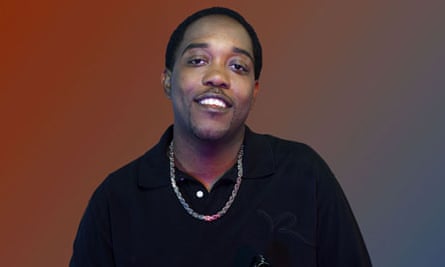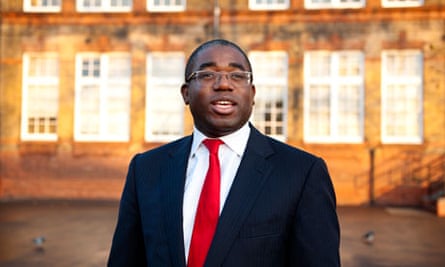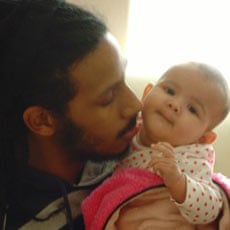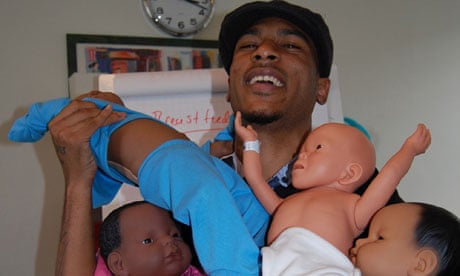If you are an African-Caribbean child you are twice as likely as your white British counterpart to grow up in a single-parent household. In fact, the figure is probably higher. An Equality and Human Rights Commission report in 2011 found that as many as 65% of African-Caribbean children are raised by one parent – nearly always the mother.
The impact of all these absent fathers, not to mention the burden on the mother, has been well documented. These children are more likely to leave education early, more likely to end up in prison, more likely to become teenage parents. The list goes on.
"I was troubled by these figures because I thought the stereotype of black fathers being absent was a thing of the past," says Seani B, a music producer and presenter on Radio 1Xtra.
He decided to investigate. Rather than reinforcing negative stereotypes, he set about trying to track down young African-Caribbean fathers who are trying to buck the trend and be present as their children grow up. The result of his findings will be broadcast in a radio documentary, Like Father, Like Son?, to be aired tomorrow.
Seani B is certainly the right man for the job. He was brought up on the White City estate in west London, one of the biggest council estates in Britain. One of four boys, Seani B left school at 17 to pursue a career in music. Many of his friends came from single-parent families – it was the norm. His relationship with his own father suffered because of his dad's heavy drinking. And, seven years ago, when he became a father himself, Seani B was aware that the cycle might be repeated.

"When my son Marcel was born, I was both excited and terrified," he says. "Some of the turmoil I felt was down to the fact that my dad was an alcoholic and wasn't quite the father I needed him to be. My dad and I had a close relationship when I was younger – I didn't understand his drinking problem; at that age I thought it was funny. As I got older, it became an obstacle in our relationship. This made me even more determined when my son was born to step up to my responsibilities and be a good father."
David Lammy, the Labour MP for Tottenham, has been trying hard to publicise this issue and is highly vocal in calling for black fathers to be more involved with their children.

Like Seani B, Lammy's motivation is personal. Lammy's late father also drank – he walked out on his family and left the country when Lammy was 12, leaving his mother to raise five children alone. Understandably, it had a serious long-term effect. "He became unimaginably important the day he left," says Lammy. "I struggled to cope with anger, self-doubt and what felt like personal betrayal. I had to lean on youth workers and priests and teachers to help me fill the great, father-shaped hole in my life."
In his Tottenham constituency, Lammy regularly comes across families who have suffered as a result of absent fathers. "When I see youths in gangs getting into the sort of trouble they did in the riots in 2011, I always ask how many of them had fathers around?"
Again the statistics are shocking. "Of the 19 young offenders arrested in Tottenham immediately after the disturbances, only two had active dads," says Lammy.
It's a self-perpetuating cycle. If you are born into a family without a good father figure, how can you possibly learn to be one yourself? If absenteeism is all you know, then why stick around? It's an issue that clearly needs addressing and one Lammy believes is building momentum.
St Michael's Fellowship in south London, for example, runs a pioneering project for fathers and fathers-to-be, aged 14-25. The family practitioner there is Seany O'Kane, who describes himself as the pied piper of young dads. He goes into nursery schools and maternity wards and encourages young fathers to sign up to his classes. Lessons cover everything from how to keep in regular contact with their children to hands-on skills such as bathing, feeding and changing nappies.
"The overwhelming majority of young men in these classes didn't have fathers around," says O'Kane. "So statistically it's easy to say they won't be around for their children. We're here to dispel the myth that they don't want to be part of their children's lives. We as a nation are chastising these young men, saying you aren't good at this – but we aren't giving them the support or the opportunities."
Seani B agrees. "If you haven't had a good role model, how do you know how to be a good father to your kid when he comes along?" he says. "I remember when Marcel was born I was so scared I was shaking. I didn't know how to cope. Lots of young dads say they'd welcome some practical advice and support, but there isn't much out there."
One person taking advantage of the classes at St Michael's is 23-year-old Cameron Scott-Marchant, whose daughter Sienna is five months old. Like most of the young men in the classes, he grew up with an absent dad. "When your baby is born it's a reality check," he says. "You hold your child and you think, I've got to be a dad now. I don't remember my dad at all. I could have walked past him today and I'd have no idea."
And like many of the other students, Cameron has been in trouble with the law. "I honestly believe if my dad had been around I wouldn't have got into trouble. I never had anyone to tell me, 'If you do this or that it's going to lead to that.' So I broke into a school and took a load of stuff and got myself arrested and went through the court system and put on tag and had half my freedom taken away before I thought, I don't want to be doing this, this isn't right. I haven't been in trouble since."
Cameron is determined to break the pattern. "I know what it's like to grow up without a dad. It's not easy and it's not easy for the mum either. How could I walk away?" he says. "I don't want that for my girlfriend. I believe I'm responsible and I will step up to my responsibilities. If you make a life you take care of it, it's that simple."

Also raised without his father's active presence is Warren Gayle. His first child, a daughter, was born when he was 18. He doesn't live with her mother and he now has a son with another woman.
"When my daughter was born I just felt like I never had no feelings for this woman," he says. "I got a text: 'I'm having your baby.' Nine months later: 'Your baby's born.'
"When my son was born everything was different. We planned that child, I was there for the birth and I saw my little man come out. Mine were the first eyes he ever saw. For me it was like, this is it now. My son's here, I've got to clean up my act, sort myself out. I've never worked in my life but I'd like to work now."
St Michael's is hoping these former students will spread the word about the classes. Jerome Henry, 26, who went there looking for support after becoming a father last summer, was so inspired by what he learned there that he set up a forum for young fathers – an informal group where they could discuss issues. He also organised a walk on Father's Day – The 100 Dads Walk – to represent fathers walking into their children's lives as opposed to walking away. He plans to do the same this year.
"The only thing I had was looking out the window waiting for my dad to turn up and take me to football," says Jerome. "He never turned up, and that hurts. I'll never do that to my daughter. There's nothing better than being a father – it's a good feeling. I'm going to be a better dad."
So, despite the bleak statistics there is some practical help out there. And now, more importantly, increasing recognition that we have a responsibility to do something. Obviously there is a long way to go, but Seani B is cautiously optimistic. "All the young dads I spoke to seem determined to learn from their own fatherless experience and be there for their kids," he says. "One positive thing which came out of my dad's addiction is that I want my son to be proud of me, I want him to think I'm a cool dad. It's not easy being a parent and we can't always get it right, but more than anything, I want other young dads to spread the word and talk about the good side of being a dad. As black men, we need to show our love. We need to show all those absent dads that they are missing out. Fatherhood is much more satisfying than driving around in a big car."

Comments (…)
Sign in or create your Guardian account to join the discussion